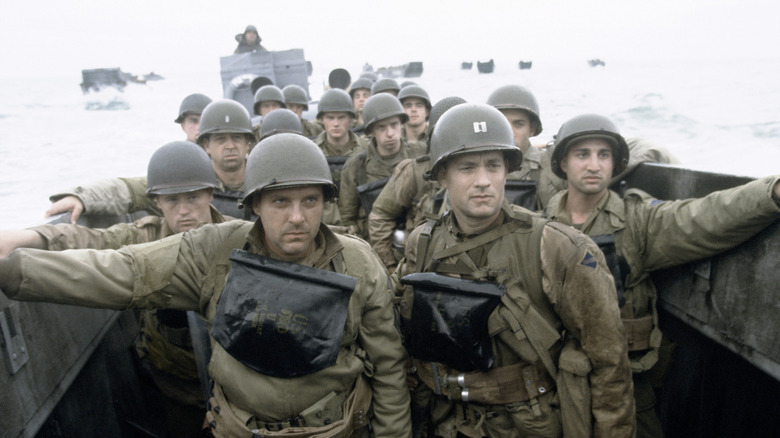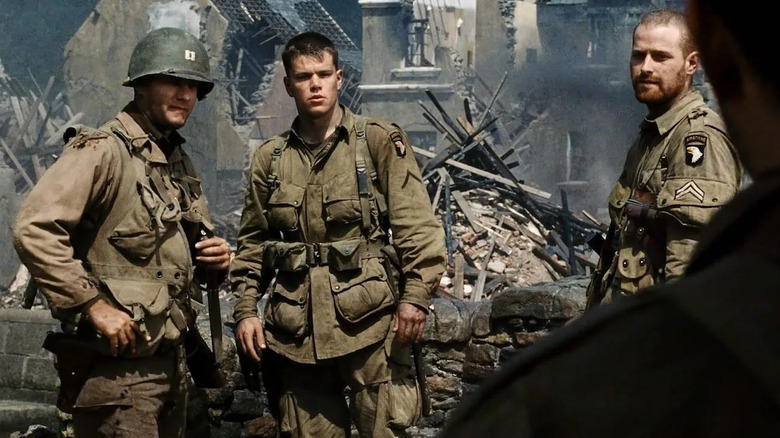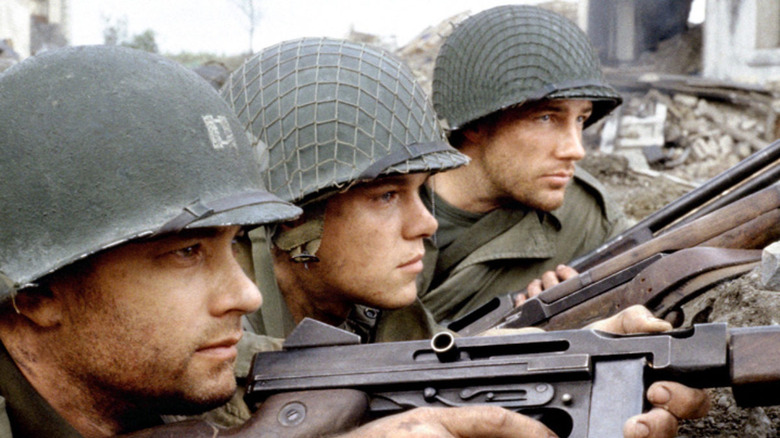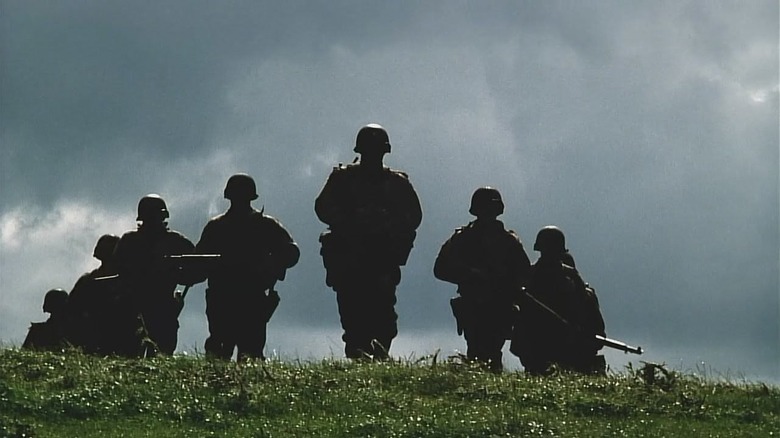Why Making Saving Private Ryan Meant So Much To Steven Spielberg
World War II still has such a powerful hold over our imaginations almost 80 years later. Personally, I was always in awe of my grandparents' stories from that time period. My maternal grandfather took a bullet in the knee during the Normandy landings, while my other granddad was ground crew for the Air Force in Egypt. He was an inch away from a gruesome death when he got way too close to a spinning propeller blade, leaving a nasty scar down the middle of his back. My grandmothers had their own tales from the home front too. I always loved the one about the German pilot who bailed out of his fighter and was treated to tea and biscuits before the military police took him away.
Watching war movies with them was always a big thing. They all had a quiet sense of pride about their small contribution to the war effort, and favorites included "Reach for the Sky," "The Dam Busters," and "Ice Cold in Alex," which I still love for its brilliant beer drinking scene. I never got to see "Saving Private Ryan" with any of them, and I've often wondered how they would have reacted, especially my mum's dad, who was actually there on D-Day. I remember watching that opening battle scene in the cinema for the first time, almost shocked to tears, just reminding myself to breathe.
There was certainly nothing like "Saving Private Ryan" in those old movies we'd watch on rainy Sunday afternoons or over the holidays. Those were cozy and congratulatory. But "Saving Private Ryan" felt overwhelmingly real and visceral. And it all came from a director for whom war stories were also very close to his heart.
So what happens in Saving Private Ryan again?
"Saving Private Ryan" opens in present day 1998 as an elderly veteran wanders through a war cemetery. He stops by a certain grave and becomes very emotional, flashing back to half a century earlier. Now we're on June 6, 1944, D-Day. The U.S. Army prepares to storm Omaha beach as part of the Normandy landings, steeling themselves for heavy German resistance. The landing crafts speed in and, as soon as the ramps drop, the men inside are cut down by a hail of withering machine gun fire.
We join Captain Miller (Tom Hanks) and his battalion as they desperately scramble across the beach towards the deadly German defences cut into the cliffs above. It's absolute carnage and a miracle anyone survived at all. Having battled their way to relative safety, Miller receives orders to locate and rescue Private James Ryan (Matt Damon), whose four brothers have all died in combat. It is the express wish of General George Marshall that the Ryan family doesn't lose all their sons, and the remaining soldier is sent home immediately.
Miller and his team make their perilous way across France in search of Ryan, negotiating several more hair-raising ambushes and skirmishes before they finally locate him, dug in with another unit ready to defend a strategic bridge as the German forces approach. Although distraught by the news of his brothers' deaths, Ryan refuses to leave his post, so Miller and his men prepare to face the coming onslaught. The stage is set for another battle that almost rivals Omaha beach for intensity, but not quite. Nothing really can.
Steven Spielberg's personal fascination with WWII
Spielberg's father Arnold, who passed away in 2020 at age 103, was a big influence on the director's filmmaking career. The filmmaker's father enlisted in the U.S. Army shortly after the Japanese attack on Pearl Harbor in 1941, serving as radio operator in the 490th Bomb Squadron (via Business Insider). He survived two combat tours in the China Burma India theater and returned home to marry and start a family, receiving an engineering degree from the University of Cincinnati as part of the G.I. Bill before moving into a career in computer science. Spielberg cites his father's love of gadgets for his own fascination with new tech:
"When I see a PlayStation, when I look at a cell phone — from the smallest calculator to an iPad — I look at my dad and I say, 'My dad and a team of geniuses started that.'"
Arnold also gave Spielberg his start in filmmaking, who received his first camera as a gift as a teenager. His first efforts were unsurprisingly war movies — you can check out a clip from "Escape to Nowhere" on YouTube. Spielberg said (via LA Times):
"I picked World War II because, growing up, it was the seminal conversation inside my family. My parents talked about the Holocaust and they talked about World War II. And I was born knowing this. My dad was a veteran... he was in the Army Air Corps from 1942 to the beginning of 1945. He had many veterans over to the house, and I became absolutely obsessed with the Second World War, based on my father's stories, recollections and also based on all the World War II movies that eventually began playing on American television."
The wartime influence on Spielberg's films
Spielberg's illustrious career has included movies in just about every genre, but war films have provided several key touchstones in his filmography. His first professional foray into the genre, "1941," was a notorious flop, but he bounced back to sock it to the Nazis with "Raiders of the Lost Ark." After an early career built on escapist cinema, he transitioned into more serious territory and returned to WWII again with "Empire of the Sun." Another Indiana Jones adventure battling Nazis followed with "The Last Crusade" before "Schindler's List" swept the Oscars, earning Spielberg his first Best Director and Best Picture wins.
"Schindler's List" was an intensely personal project for Spielberg. Coming from a Jewish family, stories of the Holocaust were built into his family's heritage as much as his father's tales of World War II, and it was a magnificent achievement that brought the horrors of genocide to a wide audience.
If "Schindler's List" was Spielberg's crowning achievement, "Saving Private Ryan" is a close second. Arguably no other mainstream film before or since has rivaled its harrowing depiction of wartime combat. As Spielberg told Roger Ebert, it was his way of challenging the old war movie staples of heroism and nobility, which lacked the brutally grim side of battle:
"This is me being 51 years old and my dad being 81, and he fought in Burma, and my wanting to acquit his war with honor, as opposed to just using his war as the backdrop for a big action adventure picture."
"Saving Private Ryan" pulls off a fine balancing act between celebrating the bravery of those involved while giving an unflinching view of combat. I think my grandparents would have approved.



